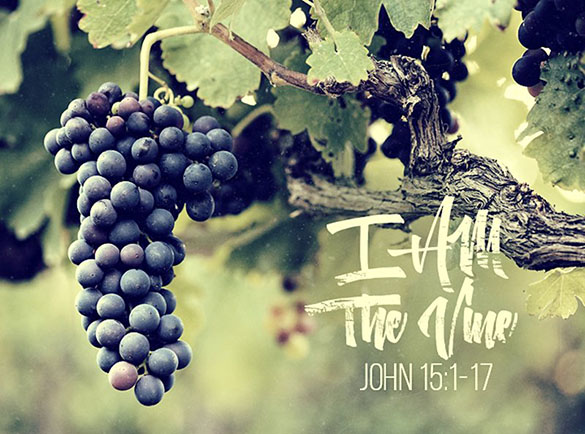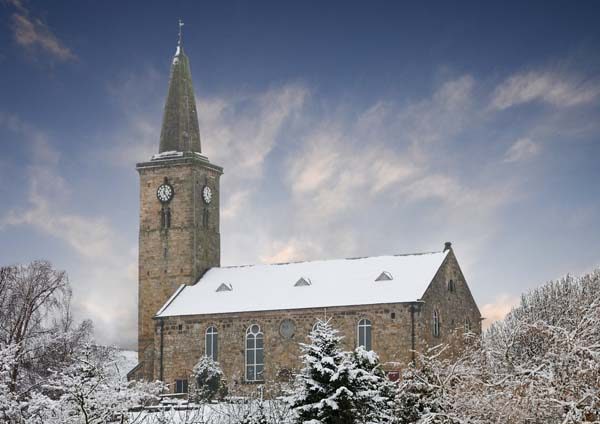A message from Rev Alistair McLeod for the Sixth Sunday of Easter.
The Gospel Passage this week is: St John Chapter 15 verses 1 to 17
Is this passage of Scripture familiar? The quote ”I am the vine and you are the branches” does stand out and feels like a message that really fits in this season of Easter. It seems especially appropriate when you think of it as preparation for Pentecost too, especially in the sense of the vine sending out branches, as we read in John’s Gospel.
We are still understanding what Easter means to us in this place and time.
We have heard stories of an encounter with Jesus on the road to Emmaus.
We heard the story about Jesus as a ‘good shepherd’, and the beautiful prayer that is Psalm 23 reminding us that we are on a pilgrimage and we know that Jesus is with us. We are also getting close to Jesus saying good-bye to the disciples, and he wants to be sure they (and we) know what to do next. So, hearing such a familiar text might tempt us to say, ’we already understand it’.
But, do we?
Let’s ‘go down the garden path’ together and go into the vineyard and take another look.
You do not have to be a gardener to understand the language in this passage. We know that grapes, raisins, and wine come from grape vines. That is the easy part. But what does the vine grower do to produce a plentiful and healthy harvest? Just for a moment, picture a vineyard in the late autumn or early winter. It is time for pruning: a vine grower walks into his vineyard with a very sharp knife. Beginning at one end, and working his way down the rows, each plant is pruned; no plant is ignored. There are obvious dead branches sucking away the life-giving force of the vine. They must be pruned to save the vine.
Other branches are pruned back too so that they will bear more fruit in the next growing season. Then there are the branches that are just not strong enough to hold the weight of the fruit. It is better to prune those back now rather than the risk of an inevitable break to happen.
When vines may need some extra help. The vine grower may cut into the vine and graft another more viable variety onto it to make it stronger and hope for the new fruit that will come from the graft
In our reading today, John describes God as the vine grower who has planted a vine, Jesus. The Father removes every branch that bears no fruit and prunes the other branches so remains on the vine and John tells us that we cannot bear fruit unless we remain in Jesus just as Jesus remains in us. Here is where the familiar phrase comes into the text. Jesus says, “I am the vine, you are the branches” Jesus tells us that by abiding in him we will bear much fruit and that apart from Jesus we achieve nothing.
This part of the Gospel really asks us to think – to think about our standing with Jesus. Maybe you have never thought about God as the vine grower, but certainly God is the Creator and God did plant Jesus into our lives. The four gospels give us four different perspectives of what it might have been like to be living as a disciple of Jesus. By reading them and engaging with them in our lives, we become intimately involved in the messages. We can then assume the role of a ‘pilgrim’ alongside Jesus.
God is the vine grower and Jesus is the vine. Our role is to be the branches. This so clearly describes our roles in God’s mission. God planted Jesus in our lives and that vine produces branches. If we are the branches, then we are also going to have to deal with the pruning part. That sounds like it is going to hurt. Every branch is cut even if it is bearing fruit now, because by cutting it will bear more fruit. If we are the branches, then what in us might need to be cut or pruned?
Looking around you might be thinking of some things that are obviously in need of being cut away. What about those things that are weighing us down? As branches, are we at risk for breakage from the weight? Might it feel good to have some of that removed? Think of what it might feel like to lose some of the baggage that is weighing us down
It seems as if there might be many things that fit easily into this category of ‘needing to be pruned’, and some not so obvious things too. One way or another, though, we know that pruning is has to happen and it will probably hurt to some degree. The end result though promises that we will be more fruitful. Our job here seems to be identifying what needs pruning in our own lives and letting it go. Our job is also to be open to being pruned of everything holding us back and our job is being open and welcoming to grafting because it will make us stronger. The hope in this whole business of pruning is the promise of fruitfulness and the assurance that just as Jesus abides in us, we abide in Jesus.
We could all probably think of many things that would fit into these categories. A topic on many of our minds these days is about how to be Christians, individually and corporately, and what that means. As an example, we know that the sins of racism and classism and sexism, and all that indeed all the many other ‘isms’ that keep us from being fruitful, wholesome, accepting and loving. Amen.
A Prayer for You:
Father, please grow in me a deep love for you and a selfless love for my family and friends and all those I meet each day.
Father, please grow in me a joyful spirit so that I can rejoice and give you praise every day.
Father, please fill me with your perfect peace that passes all understanding and grow in me the ability to trust you rather than worry and fret.
Father, especially at this time grow in me the grace to be patient and help me to endure all the hardships of this present time calmly and without complaining always knowing that you are always at my side.
Father hear my prayer through Jesus Christ the Lord.
Amen

